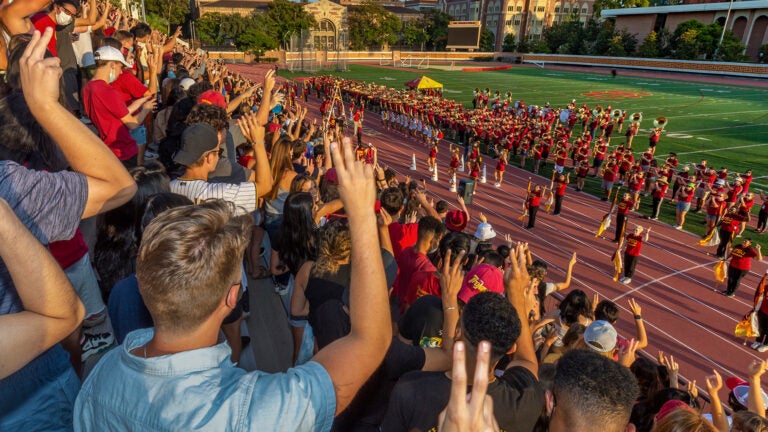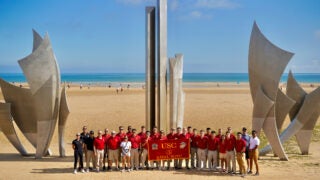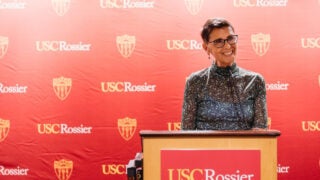
The newest Trojans show their spirit as the Trojan Marching Band and Song Girls perform at the Aug. 20, 2021, spirit rally. (USC Photo/Gus Ruelas)
Office of Campus Wellbeing and Education provides connection and community for students
The office supports Trojans’ well-being by identifying sources of personal and professional meaning and inclusion in the classroom, in the workspace and among peers.
Now more than ever, students are looking for spaces on campus that offer real connection and community. They are looking to do tangible, real work both for themselves and in their communities — not just be handed a list of resources. Importantly, student well-being is connected to the well-being of staff, faculty and the entire USC community, and the Office of Campus Wellbeing and Education (CWE) provides space for the USC community to strengthen themselves as they support each other.
The Office of Campus Wellbeing and Education supports the well-being of students, faculty, and staff across USC by consulting with many departments, student groups and individuals on practical and tangible ways to foster well-being, identify sources of personal and professional meaning, and inclusion in the classroom, in the workspace and among peers. It offers workshops, trainings and presentations on issues like burnout, compassion, conflict resolution, identity and purpose, and also provide tailored well-being assessments to schools and teams.
Schools welcome Office of Campus Wellbeing and Education facilitators
“It’s been a very stressful time over the last 18 months, and it’s been so helpful to have [Office of Campus Wellbeing and Education facilitators] moderate difficult conversations for faculty, staff and students so that we feel like a part of a community that can move forward together,” said Dean Elizabeth Daley of the USC School of Cinematic Arts.
Students especially benefit from programs like Mindful USC practice groups, that include weekly drop-in meetings and classes for practicing mindfulness as a community. The program seeks to encourage practitioners to forge connections and find strength in others as well as in ourselves. Quade French, a clinical psychologist and consultant in the Office of Campus Wellbeing and Education, said that so often mindfulness is taught as “a way for individuals to survive and cope in a broken system, but Mindful USC is about building community.”
It’s been a very stressful time over the last 18 months, and it’s been so helpful to have [Office of Campus Wellbeing and Education facilitators] moderate difficult conversations for faculty, staff and students.
Elizabeth Daley, dean,
USC School of Cinematic Arts
Mindful USC teachers guide students, faculty and staff to examine how mindfulness can be more than an item on the to-do list. Questions like “Who are you practicing with,” “How is support built into and around your schedule” and “How can you connect when you’re overly busy?” are critical for an effective practice.
The Office of Campus Wellbeing and Education also encourages students to examine themselves, their community and their surroundings through the Race, Equity, and Wellbeing (REW) series. The series offers opportunities to learn directly from USC experts and the number of student attendees has grown in recent months.
“The work of well-being, especially across diversity, equity and inclusion, caters to everyone and creates opportunities to change our culture and practices to better the lives of ourselves and those we interact with,” said Jonathan Wang, project manager for the Office of the Executive Vice President. Students can hear directly from campus leaders on their perspectives of justice and barriers at USC.
“Much of the work centers on how to think of yourself as someone who can inspire change, and to create opportunities to make your environment more inclusive and respectful of all,” said Wang. “The work often also centers on our support of those who may need our support the most – students. There’s a lot of discussion and action that stem from our work with REW, and we often think of how students will be impacted [directly or indirectly] in that work.”
Office of Campus Wellbeing and Education sees increase in student activism
Student interest in activism has notably increased over the past year, according to French.
“Students want to have dialogue with their school units. They want to know how those schools and departments are facilitating equitable access to education. Students want an active voice in their education and in their communities,” he said.
French and others at the Office of Campus Wellbeing and Education can facilitate and moderate these conversations, helping students and recognized student organizations find common ground with faculty and administration. Through respectful, civil and effective communication, students can actively advocate for equity, justice, fairness and representation in their own education.



